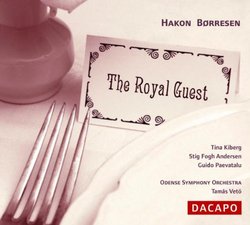| All Artists: Guido Paevatalu, Hakon Borresen, Tamas Veto, Edith Guillaume, Odense Symphony Orchestra, Tina Kiberg, Lise-Lotte Nielsen, Stig Fogh Andersen Title: Hakon Børresen: The Royal Guest Members Wishing: 0 Total Copies: 0 Label: Marco Polo Release Date: 3/22/2005 Genre: Classical Style: Opera & Classical Vocal Number of Discs: 1 SwapaCD Credits: 1 UPC: 636943602027 |
Search - Guido Paevatalu, Hakon Borresen, Tamas Veto :: Hakon Børresen: The Royal Guest
 | Guido Paevatalu, Hakon Borresen, Tamas Veto Hakon Børresen: The Royal Guest Genre: Classical |
Larger Image |
CD Details |
CD ReviewsA Delightful Danish One-Act Comic Opera J Scott Morrison | Middlebury VT, USA | 03/24/2005 (5 out of 5 stars) "Hakon Borresen (1876-1954; you have to imagine the 'o' in his last name with a slanted line through it, the Danish equivalent of 'ö') was the last Romantic holdout among Danish composers. He was eleven years younger than the forward-looking Nielsen but he continued throughout his life composing in a style that would not have seemed amiss in 1910. He wrote in a musical language rather similar to that of Grieg or Johann Svendsen - the latter his musical godfather - with a good bit of Richard Strauss thrown in. Borresen's music is unfailingly tonal, unfailingly lush, and he was a master orchestrator and characterizer of moods. This work, his one-act 1919 comic opera ('Den kongelige gaest' in Danish) that still holds the boards in his native land, is probably his best-known, although he wrote three fine symphonies, a violin concerto, two string quartets and lovely string sextet, all of which have been recorded. Strangely the otherwise very informative booklet notes for this recording say that Borresen was not a good melodist, but in fact this opera is chockful of hummable melodies. It is true that the opera does not have any set pieces--arias, duets, etc.--as it is a 'conversation opera,' rather like Strauss's later 'Intermezzo,' but the characters sing in an arioso style throughout.
The plot is fairly simple. To quote the booklet notes, '[The opera] is a little fable about how art and love can transform people and change their lives. The main characters are a married couple [a country doctor and his wife] who are visited in their quiet, static home by a mysterious, effusive guest. With his message of joie de vivre and love he breathes new life into the couple he visits.' The title comes from the guest's play-acting that he is 'Prince Carnival' (the opera takes place during the Carnival ['fastelavn' in Danish, 'Fasching' in German] season). It is based on a short-story by Danish writer Henrik Pontoppidan, who had won the Nobel Prize for Literature only two years before the opera was written. This is a chamber opera, with no chorus and only five characters--the doctor and his wife, the 'Royal Guest,' and two servants. The Danish libretto by Svend Leopold is both witty and philosophical. One can follow the Danish easily in the Danish/English/German libretto provided in the booklet. But one can also get a general idea of the action and simply sit back and enjoy this extremely lovely and high-spirited music. There is an overture that makes use of several of the melodies found in the opera proper; it is sometimes played in concert programs. The performance is marvelous. The singers are all from the Royal Danish Opera. Doctor Hoyer is sung by tenor Stig Fogh Andersen who sings, among other things, Peter Grimes and Verdi's Otello. Mrs Hoyer is a soprano who sings such roles as Agathe in 'Freischütz' and the Marschallin in 'Rosenkavalier.' The Royal Guest is baritone Guido Paevatalu who sings most of the Verdi and Mozart baritone roles at the Danish Opera. The two servants are well-taken but fairly minor roles. The orchestra is the fine Odense Symphony under Tams Vet, a Hungarian conductor who has been resident in Copenhagen for forty years, much of that time conductor at the Royal Danish Opera. It is clear that this opera is well-loved and well-served by these musicians. I had never heard it before, but was familiar with Borresen's orchestral and chamber music, so I thought I knew what to expect, but I was bowled over by the lightness and joy of the music and its performance. I would recommend this single-CD set to anyone interested in expanding their knowledge of opera from Scandinavia, a genre that can provide many rewards. TT=79:20 Scott Morrison" |
